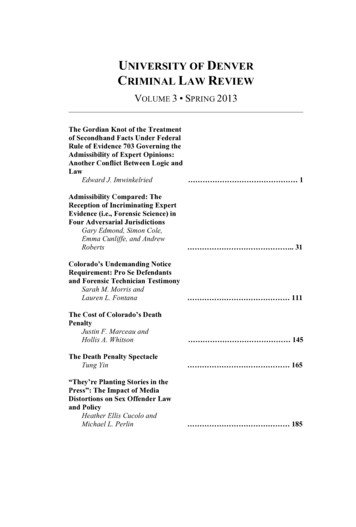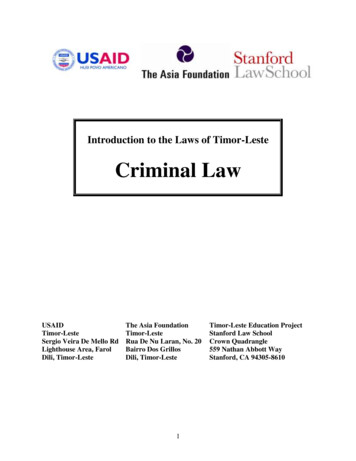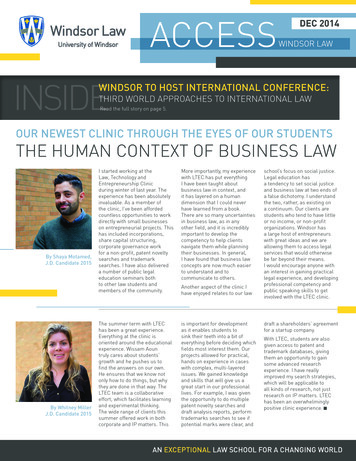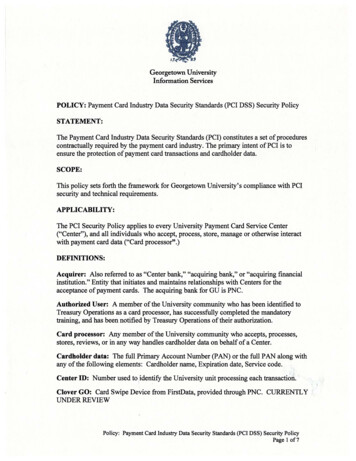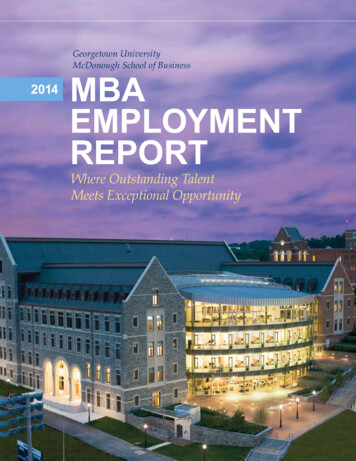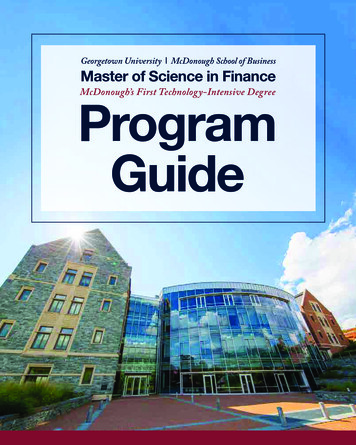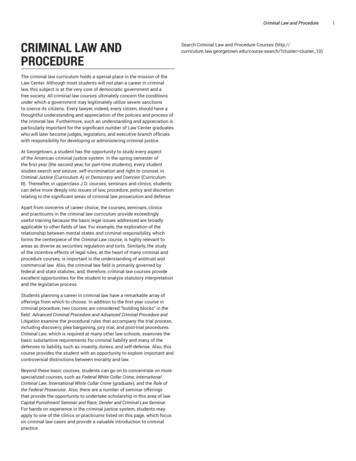
Transcription
Criminal Law and ProcedureCRIMINAL LAW ANDPROCEDUREThe criminal law curriculum holds a special place in the mission of theLaw Center. Although most students will not plan a career in criminallaw, this subject is at the very core of democratic government and afree society. All criminal law courses ultimately concern the conditionsunder which a government may legitimately utilize severe sanctionsto coerce its citizens. Every lawyer, indeed, every citizen, should have athoughtful understanding and appreciation of the policies and process ofthe criminal law. Furthermore, such an understanding and appreciation isparticularly important for the significant number of Law Center graduateswho will later become judges, legislators, and executive branch officialswith responsibility for developing or administering criminal justice.At Georgetown, a student has the opportunity to study every aspectof the American criminal justice system. In the spring semester ofthe first year (the second year, for part-time students), every studentstudies search and seizure, self-incrimination and right to counsel, inCriminal Justice (Curriculum A) or Democracy and Coercion (CurriculumB). Thereafter, in upperclass J.D. courses, seminars and clinics, studentscan delve more deeply into issues of law, procedure, policy and discretionrelating to the significant areas of criminal law prosecution and defense.Apart from concerns of career choice, the courses, seminars, clinicsand practicums in the criminal law curriculum provide exceedinglyuseful training because the basic legal issues addressed are broadlyapplicable to other fields of law. For example, the exploration of therelationship between mental states and criminal responsibility, whichforms the centerpiece of the Criminal Law course, is highly relevant toareas as diverse as securities regulation and torts. Similarly, the studyof the incentive effects of legal rules, at the heart of many criminal andprocedure courses, is important in the understanding of antitrust andcommercial law. Also, the criminal law field is primarily governed byfederal and state statutes, and, therefore, criminal law courses provideexcellent opportunities for the student to analyze statutory interpretationand the legislative process.Students planning a career in criminal law have a remarkable array ofofferings from which to choose. In addition to the first year course incriminal procedure, two courses are considered "building blocks" in thefield. Advanced Criminal Procedure and Advanced Criminal Procedure andLitigation examine the procedural rules that accompany the trial process,including discovery, plea bargaining, jury trial, and post-trial procedures.Criminal Law, which is required at many other law schools, examines thebasic substantive requirements for criminal liability and many of thedefenses to liability, such as insanity, duress, and self-defense. Also, thiscourse provides the student with an opportunity to explore important andcontroversial distinctions between morality and law.Beyond these basic courses, students can go on to concentrate on morespecialized courses, such as Federal White Collar Crime, InternationalCriminal Law, International White Collar Crime (graduate), and the Role ofthe Federal Prosecutor. Also, there are a number of seminar offeringsthat provide the opportunity to undertake scholarship in this area of law:Capital Punishment Seminar and Race, Gender and Criminal Law Seminar.For hands on experience in the criminal justice system, students mayapply to one of the clinics or practicums listed on this page, which focuson criminal law cases and provide a valuable introduction to criminalpractice.Search Criminal Law and Procedure Courses h/?cluster cluster 10)1
2Criminal Law and ProcedureLAW 1776 v00 Advanced Criminal Law Seminar: Race and Poverty inCapital and Other Criminal Cases h/?keyword LAW%201776%20v00)J.D. Seminar (cross-listed) 1 credit hourThis course addresses the issues of race, poverty, mental illness, andother issues of fairness and equality in the criminal courts, particularly indeath penalty cases. Topics include the impartiality and independence ofelected judges, competency for trial and other issues involving the mentalhealth and intellectual functioning of those accused of crimes, practicesand procedures regarding clemency, and perspectives on the experienceswith the death penalty since the Supreme Court’s decisions allowing theresumption of capital punishment in 1976.Course Goals and Learning Objectives: Students will develop knowledgeand understanding of issues regarding the impartiality of judges, thetreatment of people with mental disorders and intellectual disabilitiesin the criminal courts, the consideration of applications for clemencyby people sentenced to death, and the experiences of the courtsin adjudicating cases involving the death penalty since 1976. Theoverwhelming majority of cases – both criminal and civil – are decidedin the state courts. In almost all of the states, judges are elected. Onoccasion, the election of judges presents issues of whether judges areinfluenced by political considerations. In some cases, there are issuesof whether judges have biases with regard to people of color who comebefore them. Students will learn the grounds for disqualification of ajudge who may be biased and the law and procedures for resolvingthose issues. Students will also learn that the criminal courts deal with asignificant number of people with serious mental disorders. Students willlearn the legal standards for competency to stand trial, competency towaive appeals, and competency to be executed, as well as the proceduresfor deciding those issues. Students will also learn how the Presidentof the United States and governors decide whether to commute deathsentences and practices regarding applications for clemency. Studentswill also engage with the views of Supreme Court justices, lower courtjudges, legislators, governors and commentators with regard to issuesof fairness and discrimination with regard to the experiences of the stateand federal governments in carrying out the death penalty since theSupreme Court allowed its resumption in 1976. Finally, as part of thecourse, students will learn how to analyze issues and set out their viewsin writing and orally, supporting their positions with solid legal reasoningand proper citation to the relevant authorities.Recommended: Criminal Justice and/or Criminal Law.Note: WEEK ONE COURSE. This seminar will meet for one week only, onthe following days: Monday, January 9, 2023, through Friday, January 13,2023, 1:30 p.m. - 4:05 p.m. This course is mandatory pass/fail and will notcount toward the 7 credit pass/fail limit for J.D. students.ATTENDANCE IS MANDATORY AT ALL CLASS SESSIONS. Enrolledstudents must be in attendance at the start of the first class session inorder to remain enrolled. Waitlisted students must be in attendance at thestart of the first class session in order to remain eligible to be admittedoff the waitlist. All enrolled students must attend each class sessionin its entirety. Failure to attend the first class session in its entirety willresult in a drop; failure to attend any subsequent class session in itsentirety may result in a withdrawal. Enrolled students will have until thebeginning of the second class session to request a drop by contactingthe Office of the Registrar; a student who no longer wishes to remainenrolled after the second class session begins will not be permitted todrop the class but may request a withdrawal from an academic advisor inthe Office of Academic Affairs. Withdrawals are permitted up until the lastclass for this specific course.LAW 032 v02 Advanced Criminal Procedure h/?keyword LAW%20032%20v02)J.D. Course 2 credit hoursThe stages of the criminal process beginning with the filing of chargesthrough the sentencing stage are analyzed. Legal issues arising at eachstage will be examined. How the legal and administrative obligationsof the participants in the process -- the court, prosecutor and defensecounsel -- influence decision-making at various stages is explored. Theprosecutor’s paramount role is to advocate aggressively on behalf ofthe government. However it cannot be unmindful of its administrativeresponsibility to process cases expeditiously. Protecting the rights ofthe accused is a defense attorney’s foremost obligation but not withouta regard for the attorney’s duties as an officer of the court. Arbitratingmatters is a core judicial activity in the criminal process; influencedby the court's desire to move cases to conclusion. Burdens of proofto resolve procedural issues are studied in the context of how theallocations of burdens of proof are allocated to achieve philosophicalinterests to be accommodated by the system.Prosecutorial discretion in the charging function, the constitutional basistherefore and limitation thereon are explored. Preliminary proceduralsteps as well as grand jury process, joinder and severance of defendantsand charges, the right to a speedy trial, discovery, trial issues arising incomplex multi-defendant trials, the evolving federal constitution law onthe right to confrontation, the presentation of evidence, jury instructionsand sentencing issues are all studied.Prerequisite: Criminal Justice (or Democracy and Coercion) or CriminalProcedure.Recommended: Evidence.Mutually Excluded Courses: Students may not receive credit for both thiscourse and Advanced Criminal Procedure and Litigation or Serial andAdnan Syed: Special Topics in Criminal Procedure or Criminal Justice II:Criminal Trials.LAW 032 v06 Advanced Criminal Procedure h/?keyword LAW%20032%20v06)J.D. Course 2 credit hoursThis course examines the process of criminal litigation beginning withthe filing of charges and continuing through the trial. Topics coveredinclude the exercise of prosecutorial discretion in the charging function,the preliminary examination and grand jury, bail, joinder and severanceof defendants and charges, the right to a speedy trial, discovery, trialissues, the right to confrontation, the presentation of evidence, and juryinstructions.Prerequisite: Criminal Justice (or Democracy and Coercion) or CriminalProcedure.Recommended: Evidence.Mutually Excluded Courses: Students may not receive credit for both thiscourse and Advanced Criminal Procedure and Litigation or Serial andAdnan Syed: Special Topics in Criminal Procedure or Criminal Justice II:Criminal Trials.
Criminal Law and ProcedureLAW 032 v03 Advanced Criminal Procedure and Litigation h/?keyword LAW%20032%20v03)J.D. Course 2 credit hoursThis course addresses the law, strategy, and ethical considerationsof criminal procedure and litigation beginning with the decision tocommence an investigation and/or charge through sentencing.Topics to be explored will include the prosecutorial decision to charge,representation (e.g., conflicts) of and compensation (e.g., forfeiture)by client issues, grand jury practice, immunity and plea negotiating,discovery, motions practice, prosecutorial and defense misconduct,selected trial issues, and sentencing. Materials for this course will includecourt opinions, pleadings from actual cases, Department of Justicemanuals and policies, and news and law articles. The course may beorganized around an actual case from its investigation inception, throughpre-trial motions and discovery, to trial and verdict.Prerequisite: Criminal Justice (or Democracy and Coercion) or CriminalProcedure.Mutually Excluded Courses: Students may not receive credit for both thiscourse and Advanced Criminal Procedure or Criminal Justice II: CriminalTrials.3LAW 1167 v00 Anatomy of a Federal Criminal Trial: The Prosecution andDefense Perspective /?keyword LAW%201167%20v00)J.D. Seminar 2 credit hoursThis course will be an in-depth analysis of the investigation and trial of afederal white collar criminal case led by an experienced criminal defenseattorney and an experienced prosecutor who faced each other in thecourtroom during the trial of a former executive of Enron Corporation.This course will use a hypothetical case study based on the Enrontrial the instructors conducted against each other beginning at theinvestigative stage through the charging stage and continuing throughtrial and sentencing.Through discussion and selected assignments representative ofdifferent stages of the prosecution, students will critically examine thehypothetical criminal prosecution from both sides of the adversarialprocess – moving beyond a discussion of the basic stages of the trialinto an analysis of how each side approaches each stage – askingthemselves what they hope to accomplish and what is the best methodfor doing so.Each student will do a total of three written assignments and two oralassignments.Learning Objectives:The goal of this course is to provide a realistic and practical view intowhat it is actually like to be a prosecutor or a defense counsel, andthe decisions and considerations they make through each stage of amatter, from investigation through sentencing and appeal. The learningoutcomes for the course include: Knowledge of each stage of a white collar investigation, from adefense and prosecutorial perspective. Ability to engage in a lively discussion while letting go of the fear of a“wrong answer.” Ability to engage in critical and strategic thinking beyond black letterlaw and into the practical effects of a particular course of action aswell as any related policy considerations.Prerequisite: Criminal Justice (or Democracy and Coercion) or CriminalProcedure.Mutually Excluded Courses: Students may not receive credit for both thisclass and Federal Prosecution.
4Criminal Law and ProcedureLAW 504 v01 Appellate Courts Immersion Clinic h/?keyword LAW%20504%20v01)J.D. Clinic 12 credit hoursPlease see the Appellate Courts Immersion Clinic website ing/clinics/appellate-courtsimmersion-clinic) for more detailed information about the program.For registration-specific supplemental materials, please see the AppellateCourts Immersion Clinic PDF 95d3zly021bifudc).For more information about clinic registration generally, please seethe Clinic Registration Handbook tyrl6nj9pyv6).Mutually Excluded Courses: Students may not receive credit for both thiscourse and the Appellate Practice Seminar. Students in this clinic maynot concurrently enroll in another class, clinic, externship or practicum.LAW 504 v00 Appellate Litigation Clinic h/?keyword LAW%20504%20v00)J.D. Clinic 9 credit hoursPlease see the Appellate Litigation Clinic website ing/clinics/appellatelitigation-clinic) for more detailed information about the program.For registration-specific supplemental materials, please see theAppellate Litigation Clinic PDF bttmqgkh1f080t15).For information about clinic registration generally, please see theClinic Registration Handbook tyrl6nj9pyv6).Mutually Excluded Courses: Students may not receive credit for both thiscourse and the Appellate Practice Seminar.Students may not concurrently enroll in this clinic and an externship or apracticum course.LAW 1175 v01 Borders and Banishment Seminar h/?keyword LAW%201175%20v01)J.D. Seminar (cross-listed) 2-3 credit hoursThis course explores practices of border fortification, incarceration,criminal law enforcement, and immigration policing. Migration andincarceration—borders and banishment—present some of the mostpressing legal and moral controversies in contemporary public life. Overthe past two decades, criminal-immigration matters have become themost commonly prosecuted federal crimes; populations in prison, jail andimmigration detention have dramatically increased; and though majorproposed immigration reforms are stymied in Congress, pressures forreform in both the immigration and criminal contexts continue to mount.The course will begin by considering the historical, social psychological,and legal foundations of border fortification and banishment practices.Then, attention will turn to some of the crises that pervade borderenforcement, policing, and incarceration settings—from the presenceof millions of people in the United States without legal status, to theexplosion in criminal and immigration detention, police violence, andthe widespread problem of sexual assault and prison rape. Reformistalternatives to the status quo in immigration and criminal legal processeswill be considered, including through examination of social movementprojects, prisoner advocacy, and public interest practice settings focusedon relevant reform. Course readings and discussion will center onproposed criminal and immigration law reform and more far-reachingalternatives to borders and banishment. The course will conclude byinvestigating various abolitionist efforts to think and work beyondborders and banishment. Students will reflect in class and in writing onthe various components of the course in relation to their own interests.There are no prerequisites. All students are welcome.Recommended: Criminal Justice (or Democracy and Coercion), CriminalLaw, Immigration Law.Note: THIS COURSE REQUIRES PROFESSOR PERMISSION TO ENROLL.Please email Professor Allegra McLeod (mcleod@law.georgetown.edu)and Karly Mitchell (km1602@law.georgetown.edu) by 5:00 pm onWednesday, June 9, 2021 expressing your interest in taking the seminar.Please include whether you want to take the course for 2 or 3 credits.FIRST AND SECOND CLASS ATTENDANCE IS MANDATORY. Enrolledstudents must be in attendance at the start of the first class session inorder to remain enrolled. Waitlisted students must be in attendance at thestart of the first class session in order to remain eligible to be admittedoff the waitlist. All enrolled students must attend each class sessionin its entirety. Failure to attend the first class session in its entirety willresult in a drop; failure to attend any subsequent class session in itsentirety may result in a withdrawal. This seminar requires a paper. J.D.students must register for the 3 credit section of the seminar if theywish to write a paper fulfilling the Upperclass Legal Writing Requirement.The paper requirements of the 2 credit section will not fulfill the J.D.Upperclass Legal Writing Requirement.
Criminal Law and Procedure5LAW 090 v00 Capital Punishment Seminar h/?keyword LAW%20090%20v00)J.D. Seminar 2-3 credit hoursThis seminar focuses on the substantive law of capital punishmentand on the procedural aspects of post-conviction proceedings. Thecourse will include an examination of the history of death penaltyjurisprudence, habeas corpus, recent U.S. Supreme Court cases, publicpolicy issues, and state and federal death penalty statutes. The writingrequirement offers students an opportunity to write on a topic of theirchoice pertaining to the death penalty.LAW 003 v00 Criminal Justice h/?keyword LAW%20003%20v00)J.D. Course 4 credit hoursIntroduces the administration of the criminal justice system andserves as a foundation for the advanced courses offered in upperclassyears. The course explores the development and operation of theconstitutional provisions regulating the federal and state governments inthe enforcement of their penal laws and analyzes in depth each step inthe criminal process, including some or all of the following issues: searchand seizure, arrest, interrogation, the right to counsel, plea bargaining,right to jury trial, and sentencing.Mutually Excluded Courses: Students may not receive credit for thiscourse and The Death Penalty in America Seminar or the Death PenaltyLitigation Practicum.Mutually Excluded Courses: Students may not receive credit for both thiscourse and Criminal Procedure or Democracy and Coercion. Studentsmay take both this course and Criminal Law.Note: This seminar requires a paper. Students must register for the 3credit section of the seminar if they wish to write a paper fulfilling theUpperclass Legal Writing Requirement. The paper requirements of the 2credit section will not fulfill the Upperclass Legal Writing Requirement.Note: This course is open to J.D. students only and is restricted toevening students and transfer students from other law schools. Thecourse will enroll via waitlistLAW 080 v00 Computer Crime Law h/?keyword LAW%20080%20v00)J.D. Course (cross-listed) 3 credit hoursThis course will explore the legal issues that judges, legislators,prosecutors, and defense attorneys confront as they respond to therecent dramatic increase in computer-related crime. In particular, wewill consider how crimes online challenge traditional approaches to theinvestigation, prosecution, and defense of crime that have evolved fromour experience with crimes in physical space. Topics will include: theFourth Amendment online, the law of electronic surveillance, computerhacking and other computer crimes, cyberterrorism, the First Amendmentand the Internet, and civil liberties online.Although much of this class involves computer and internet technology,no prior technical background or knowledge is required.Any technology that needs to be understood will be explained in class,and students should not hesitate to ask for other technical explanations.LAW 512 v01 Criminal Defense and Prisoner Advocacy Clinic h/?keyword LAW%20512%20v01)J.D. Clinic 14 credit hoursPlease see the Criminal Defense & Prisoner Advocacy Clinic cy-clinic) for more detailed information about theprogram.For registration-specific supplemental materials, please see theCriminal Defense and Prisoner Advocacy Clinic PDF �db679d9iusz4ivbb).For information about clinic registration generally, please see theClinic Registration Handbook tyrl6nj9pyv6).Mutually Excluded Courses: Students may not concurrently enroll in thisclinic and an externship or a practicum course.LAW 003 v01 Criminal Justice h/?keyword LAW%20003%20v01)J.D. Course 4 credit hoursIntroduces the administration of the criminal justice system andserves as a foundation for the advanced courses offered in upperclassyears. The course explores the development and operation of theconstitutional provisions regulating the federal and state governmentsin the enforcement of their penal laws and analyzes in depth each stepin the criminal process up to the decision to charge, including someor all of the following issues: search and seizure, arrest, interrogation,identification procedures, and the right to counsel.Note: The Summer section of this course will enroll via waitlist and isrestricted to evening students and transfer students from other lawschools.LAW 512 v00 Criminal Justice Clinic h/?keyword LAW%20512%20v00)J.D. Clinic 14 credit hoursPlease see the Criminal Justice Clinic website ing/clinics/criminal-justiceclinic) for more detailed information about the program.For registration-specific supplemental materials, please see theCriminal Justice Clinic PDF 6tetvjrqrnhpklj2).For information about clinic registration generally, please see theClinic Registration Handbook tyrl6nj9pyv6).Mutually Excluded Courses: Students may not concurrently enroll in thisclinic and an externship or a practicum course.
6Criminal Law and ProcedureLAW 1652 v00 Criminal Justice II: Criminal Trials h/?keyword LAW%201652%20v00)J.D. Course 3 credit hoursThis course traces the litigation of criminal cases from the time the policehand the case off to the prosecutor through final judgment, sentencing,and post-trial relief. Among the topics covered: pretrial release andbail; prosecutorial discretion in charging; venue; defendant’s right tocounsel and the role of defense counsel; grand jury and preliminaryhearing; joinder and severance; gag orders; discovery; right to speedytrial; privilege against self-incrimination and grants of immunity; pleabargaining and guilty pleas; jury selection; sentencing; double jeopardy;and post-trial processes to correct erroneous judgments (appeal andhabeas corpus). The course focuses principally on Supreme Courtdecisions, but also visits where appropriate the rules of criminalprocedure. This course includes all the topics covered in the two-creditAdvanced Criminal Procedure course, but uses the extra credit hour to digdeeper on the most interesting issues and includes post-trial proceduresnot usually covered in Advanced Criminal Procedure.Recommended: It is desirable but not essential that the student havetaken Evidence before or is taking it contemporaneously.Mutually Excluded Courses: Students may not receive credit for thiscourse and Advanced Criminal Procedure.LAW 1655 v00 Criminal Justice Reform Seminar h/?keyword LAW%201655%20v00)J.D. Seminar 2-3 credit hoursThis course will familiarize students with the history, law, policy, andadvocacy for criminal justice reform in the United States. The coursewill examine criminal justice reform from both policy and advocacyperspectives. The course will examine: 1) the problems with the Americancriminal justice system; 2) the institutional actors involved in the effort tocreate criminal justice reform; 3) the strategies that reform advocates usein pressing for criminal justice reform through both policy change andlitigation; and 4) the successes advocates have made in reforming theAmerican justice system.The course is available as 2 or 3 credits.Note: This seminar requires a paper. J.D. students must register for the3 credit section of the seminar if they wish to write a paper fulfillingthe Upperclass Legal Writing Requirement. The paper requirementsof the 2 credit section will not fulfill the J.D. Upperclass Legal WritingRequirement.LAW 1485 v00 Criminal Justice Technology, Policy, and Law h/?keyword LAW%201485%20v00) (Project-Based Practicum)J.D. Practicum 4 credit hoursIn a project-based practicum course, students participate in a weeklyseminar and work on a project under the supervision of their professors.This practicum will explore the impact of technology on the criminaljustice system, and will teach students how to design, build andunderstand technologies that affect criminal justice processes andpolicy. Students will participate in a two hour/week seminar and carryout 10 hours/week of project work under the direction of the courseprofessors.SEMINAR: Seminars will review the design, deployment, and impactof technologies throughout the criminal justice system, from lawenforcement surveillance and monitoring tools to algorithmic riskassessments used in bail decisions and sentencing. Students will beasked to view these tools through two critical lenses: how well thesetools further their stated policy aims, and how technology changespower relationships between government and citizens. Throughout thesemester, students will also hear from guest speakers that are usingtechnology to tackle police misconduct, expungement, and other criminaljustice policy issues. To complement this policy discussion, studentswill learn techniques to design, deploy, and analyze criminal justicefocused technology. These exercises will teach analytical approachesto developing and understanding technology systems, including:activity-centered design, system mapping, specification building, toolselection, and prototyping. (No computer science or coding knowledge isnecessary to take this course.) The semester will conclude with a pitchday, where students will present a policy or procedural problem they haveidentified in the criminal justice system that could be addressed throughtechnological tools, and present their proposed design for a solution.PROJECT WORK: Students will work with clients and the practicuminstructors to identify problems in the criminal justice system that couldbe improved through the use of technological tools, then design suchtools working in small teams. Potential practicum projects could includedigitizing Miranda warnings, using text messages to lower failure toappear rates in juvenile court, or determining how to use the DigitalMillennium Copyright Act (DMCA) to help people whose criminal recordshave been expunged but whose record information is still availableonline.Prerequisite: Students must complete the required first-year programprior to enrolling in this course (part-time and interdivisional transferstudents may enroll prior to completing Criminal Justice, Property, or theirfirst-year elective).Mutually Excluded Courses: Students may not concurrently enroll inthis course and a clinic or another practicum course. Students mayconcurrently enroll in this course and an externship.Note: This practicum course is open to LL.M. studen
commercial law. Also, the criminal law field is primarily governed by federal and state statutes, and, therefore, criminal law courses provide excellent opportunities for the student to analyze statutory interpretation and the legislative process. Students planning a career in criminal law have a remarkable array of offerings from which to choose.

